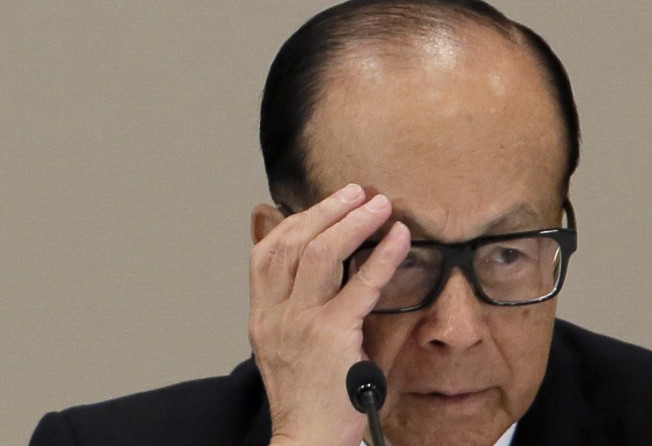
Li Ka-shing could act as fatherly figure to Chinese firms looking towards Britain
Hong Kong’s iconic billionaire tycoon way ahead of Beijing in terms of investment

Hong Kong billionaire Li Ka-shing has invested more in the United Kingdom than all of mainland China combined, a legacy which could be about to pay dividends in some unexpected ways.
His long track record of successful investment in the country makes him a potentially valuable asset as China sets its sights on winning hearts and minds with a bounty of investment funding.
Chinese president Xi Jinping has made headlines during his lucrative visit to the United Kingdom, where he announced more than US$46.23 billion in deals including a US$9.25 billion investment in the country’s first nuclear power plant.
With Hong Kong businessman Li Ka-shing’s long history of investment in Britain, Chatham House London associate fellow Kerry Brown said Li was uniquely positioned to give expert advice to Chinese companies looking to invest in United Kingdom - for a price.
“He could play a really pivotal role, if it all works out well, but I don’t think Chinese on the mainland should expect he’ll do it as a gift,” he said.
Li Ka-shing could play a really pivotal role, if it all works out well, but I don’t think Chinese on the mainland should expect he’ll do it as a gift. He didn’t become one of the wealthiest men in the world by giving people gifts
“He didn’t become one of the wealthiest men in the world by giving people gifts.”
Brown said if Chinese companies investing in Britain followed Li’s example, they’d do very well.
Li was there long before the competition - since 1995, he has invested about US$52 billion in the country through his companies and foundations, according to Dealogic.
In comparison, until Xi’s visit, Chinese companies had only invested about US$36 billion over the same period, with the vast majority flowing into Britain over the past three years.
An article by media website Caijing Insight which was shared widely on WeChat described Li as a “superman” who had foreseen the benefits of investing in Britain.
“Li’s success in investment comes from his far-sighted judgement of the global economy... from his acute analysis of British economic development [and] from his accurate grasp of his own advantages,” the author wrote.
Hongkonger Li’s most recent deal in the United Kingdom has been a US$15 billion deal to buy cellphone operator O2 through his company Hutchinson Whampoa.
In addition to this, Li owns stakes in the United Kingdom’s power and water systems, including a US$9 billion deal in 2010 to acquire part of the country’s electricity network.
Li’s success in investment comes from his far-sighted judgement of the global economy... from his acute analysis of British economic development [and] from his accurate grasp of his own advantages
Chinese mainland investment in the United Kingdom was negligible until the China Development Bank purchased 8 per cent of UK bank Barclays in 2007 for about US$3 billion.
Since then, investment has rapidly accelerated with dozens of deals since 2012 totalling more than US$10 billion.
While Li may benefit indirectly through his investments in the United Kingdom’s infrastructure and communications networks, Trusted Sources China Research managing director Jonathan Fenby said Xi’s announced spending was outside Li’s sphere of interest.
“His infrastructure is not in nuclear, it’s not in the northwest [of Britain] and it’s not in railways,” he said. “He’s in ports, he’s not in the areas for which are specifically targeted for Chinese investment.”
In September Li was accused by Chinese media of abandoning investment on the mainland, with party mouthpiece China Daily urging readers to “make his departure today become his regret tomorrow”.
Additional reporting by Sidney Leng